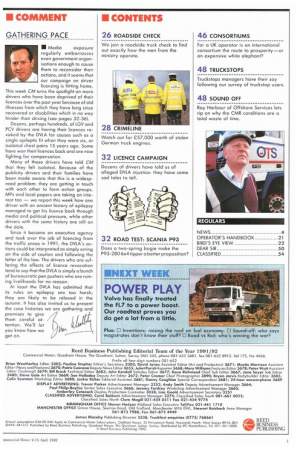U COMMENT
Page 3

If you've noticed an error in this article please click here to report it so we can fix it.
• Media exposure regularly embarrasses even government organisations enough to cause them to reconsider their actions, and it seems that our campaign on driver licensing is hitting home. This week CM turns the spotlight on more drivers who have been deprived of their licences over the past year because of old illnesses from which they have long since recovered or disabilities which in no way hinder their driving (see pages 32-361.
Dozens, perhaps hundreds, of LGV and PCV drivers are having their licences revoked by the DVLA for causes such as a single epileptic fit when they were six, or isolated chest pains 15 years ago. Some have won their licences back and are now fighting for compensation.
Many of these drivers have told CM that they felt isolated. Because of the publicity drivers and their families have been made aware that this is a widespread problem: they are getting in touch with each other to form action groups. MPs and local papers are taking an interest too — we report this week how one driver with an ancient history of epilepsy managed to get his licence back through media and political pressure, while other drivers with the same history are still on the dole.
Since it became an executive agency and took over the job of licencing from the traffic areas in 1991, the DVLA's actions could be interpreted as simply erring on the side of caution and following the letter of the law. The drivers who are suffering the effects of licence revocation tend to say that the DVLA is simply a bunch of bureaucratic pen pushers who are ruining livelihoods for no reason.
At least the DVLA has admitted that its rules on epilepsy are too harsh; they are likely to be relaxed in the autumn. It has also invited us to present the case histories we are gathering and promises to give them careful attention. We'll let you know how we get on.




























































































